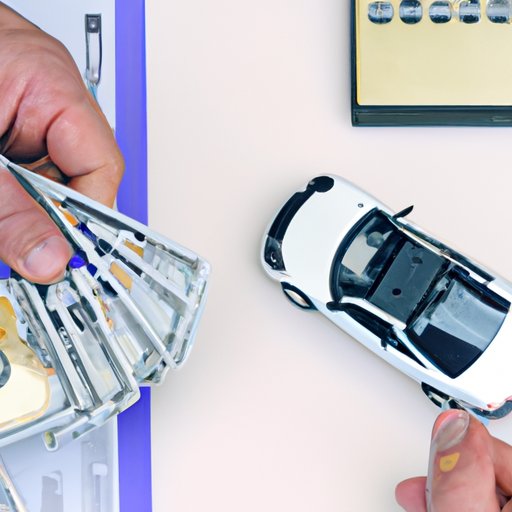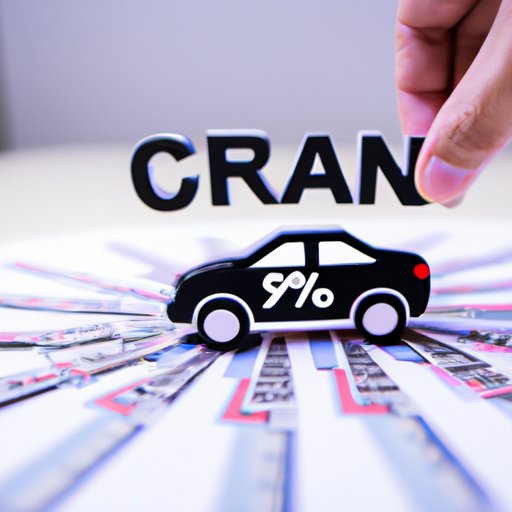Introduction
When taking out a car loan, it is important to understand how interest works. Interest is an additional cost that is charged for borrowing money, and it is calculated as a percentage of the total loan amount. When taking out a car loan, understanding how interest works can help you make informed decisions about the best type of loan for your needs and budget.
This article will explore how interest works on a car loan, compare different types of interest rates, examine the benefits and drawbacks of fixed versus variable interest rates, discuss strategies for negotiating lower interest rates, and look at ways to pay off a car loan faster in order to minimize interest costs.

Comparing Different Types of Interest Rates for Car Loans
When taking out a car loan, understanding the different types of interest rates available is key to finding the right loan for your needs. The two main types of interest rates for car loans are fixed and variable. With a fixed interest rate, the rate remains the same throughout the life of the loan. With a variable interest rate, the rate can fluctuate over time depending on market conditions.
“The interest rate you qualify for will be based on several factors, including your credit score, the type of loan product you select, and the lender you choose,” says Mark McEwan, a financial advisor with Bankrate. “It’s important to shop around to find the best rate for your situation.”

Examining the Benefits and Drawbacks of Fixed vs Variable Interest Rates for Car Loans
Fixed interest rates offer predictability and stability since the rate remains the same throughout the life of the loan. This allows borrowers to easily plan and budget for their car loan payments. However, fixed interest rates tend to be higher than variable rates, so borrowers may end up paying more in interest overall.
Variable interest rates, on the other hand, can be beneficial if they start out lower than fixed rates. However, they come with the risk that the rate could increase over time, resulting in higher monthly payments. Additionally, variable interest rates can be difficult to predict, making it harder to plan and budget for car loan payments.

Strategies for Negotiating Lower Interest Rates on Car Loans
There are several strategies borrowers can use to negotiate for lower interest rates on car loans. One way to do this is to have a good credit score. A high credit score can make it easier to qualify for better interest rates, so it is important to check your credit report regularly and take steps to improve your score if necessary.
Another strategy borrowers can use to negotiate for lower interest rates is to shop around and compare offers from different lenders. Taking the time to research and compare offers can help you find the best deal available.
Finally, it is possible to negotiate directly with lenders for lower interest rates. Borrowers can contact lenders and explain why they believe they deserve a lower rate. While this strategy may not always work, it is worth trying if you feel you have a strong case.
Ways to Pay Off a Car Loan Faster and Minimize Interest Costs
Making extra payments on a car loan can help borrowers pay off their loan faster and reduce the amount of interest they pay. Some lenders allow borrowers to make additional payments without penalty, while others may charge a fee or require a minimum payment amount. It is important to check with your lender before making extra payments to ensure you are not subject to any fees.
Another option for paying off a car loan faster is to refinance the loan. Refinancing can potentially lower the interest rate and shorten the loan term, resulting in lower overall interest costs. However, it is important to weigh the potential savings against the cost of refinancing, which may include fees and closing costs.
Conclusion
Taking out a car loan requires careful consideration of the various types of interest rates available, as well as the pros and cons of fixed versus variable rates. Furthermore, there are strategies for negotiating lower interest rates and ways to pay off a car loan faster in order to minimize interest costs. By understanding how interest works on a car loan, borrowers can make informed decisions and save money in the long run.
For readers looking to secure the best terms for their car loan, the key points to remember are to shop around and compare offers, have a good credit score, and consider making extra payments or refinancing to reduce the amount of interest paid over the life of the loan.
(Note: Is this article not meeting your expectations? Do you have knowledge or insights to share? Unlock new opportunities and expand your reach by joining our authors team. Click Registration to join us and share your expertise with our readers.)
